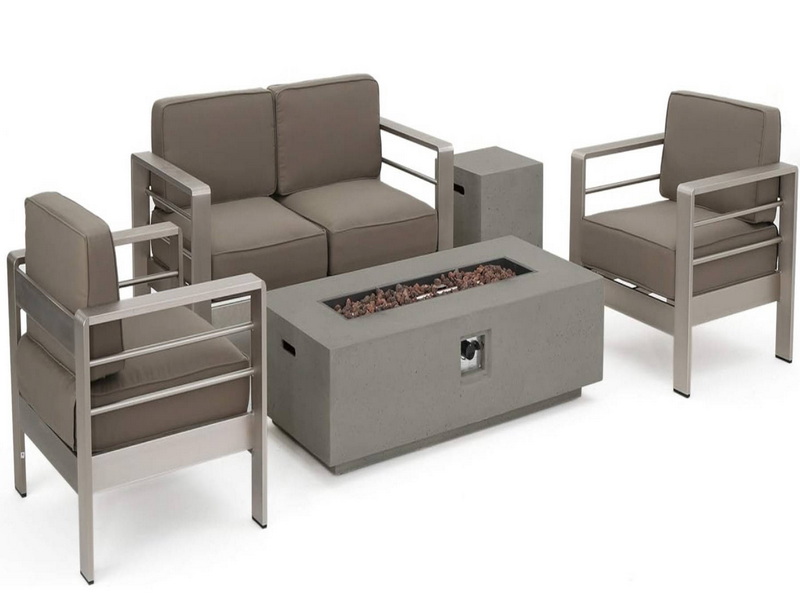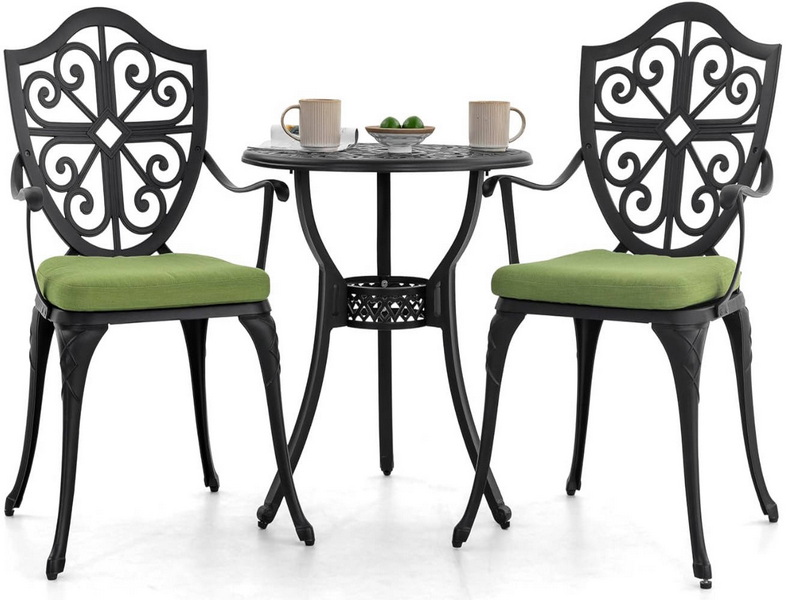English 




Views: 222 Author: Astin Publish Time: 2025-03-27 Origin: Site



Content Menu
● Introduction to Painting Aluminum Furniture
>> Benefits of Painting Aluminum Furniture
● Preparing Aluminum Furniture for Painting
● Advanced Painting Techniques
>> Stenciling
● Maintenance Tips for Painted Aluminum Furniture
>> 1. What type of primer should I use for aluminum furniture?
>> 2. Can I use regular spray paint on aluminum furniture?
>> 3. Do I need to sand aluminum furniture before painting?
>> 4. How do I maintain painted aluminum furniture?
>> 5. Can I use powder coating instead of painting?
Painting aluminum furniture is a rewarding DIY project that can breathe new life into your outdoor or indoor decor. Aluminum is a popular choice for furniture due to its lightweight, durable, and corrosion-resistant properties. However, to achieve a smooth, long-lasting finish, proper preparation and the right techniques are crucial. This comprehensive guide will walk you through the steps to paint aluminum furniture like a pro.

Aluminum furniture is versatile and can be found in various settings, from patio sets to indoor decor pieces. While aluminum naturally has a sleek appearance, painting it can enhance its beauty and protect it from the elements. The process involves several key steps: cleaning, sanding, priming, painting, and sealing. Each step is vital for ensuring that the paint adheres well and lasts long.
- Enhanced Appearance: Painting allows you to customize the color and style of your furniture to match your decor.
- Protection: Paint provides an additional layer of protection against corrosion and weathering.
- Durability: Properly painted aluminum furniture can withstand outdoor conditions better.
Preparation is the most critical phase of painting aluminum furniture. It involves cleaning, removing oxidation, sanding, and applying a primer.
Start by thoroughly cleaning the aluminum surface to remove dirt, grease, or oil. Use a mixture of mild soap and warm water. For stubborn stains or heavy grime, consider using a specialized aluminum cleaner. Rinse the surface thoroughly and allow it to dry completely. This step is crucial as any residue can interfere with paint adhesion.
Aluminum naturally forms a layer of oxidation over time, which can interfere with paint adhesion. To remove oxidation, use a solution of equal parts vinegar and water. Apply the solution with a sponge or cloth, then rinse thoroughly and dry. For more severe oxidation, you might need to use a chemical etching solution specifically designed for aluminum.
Sanding is essential for creating a rough surface that allows the paint to adhere better. Start with coarse-grit sandpaper (80 to 100 grit) to remove any imperfections, then switch to finer grit sandpaper (400 grit or higher) for a smoother finish. After sanding, wipe the surface with a damp cloth to remove dust. This step helps ensure a strong bond between the aluminum and the paint.
Use a self-etching primer specifically designed for aluminum. This type of primer creates a strong bond between the aluminum and the paint, preventing corrosion and ensuring durability. Apply the primer evenly according to the manufacturer's instructions and allow it to dry completely. A primer is essential for achieving a long-lasting finish.
Once the surface is prepared, you can proceed to paint your aluminum furniture.
Select a paint specifically formulated for metal surfaces. For outdoor furniture, choose exterior-grade paint that is weather-resistant and UV-resistant. Avoid high-gloss finishes as they highlight imperfections; instead, opt for satin or semi-gloss finishes. These finishes provide a more even appearance and are easier to maintain.
Use a spray can for small, intricate pieces or a brush for larger surfaces. Apply the paint in thin, even coats, allowing each coat to dry completely before applying the next. Sand lightly between coats for a smoother finish. Always follow the manufacturer's instructions regarding the number of coats and drying times. It's also important to work in a well-ventilated area to avoid inhaling fumes.
After the final coat of paint is dry, consider applying a clear enamel sealer to protect the paint from fading and chipping. Apply at least two coats of sealer, allowing each coat to dry according to the manufacturer's instructions. This step adds an extra layer of protection against the elements and extends the life of the paint.

For those looking to add more complexity to their design, consider using advanced techniques like stenciling or layering different colors. Stenciling allows you to add intricate designs or patterns, while layering colors can create a unique, multi-dimensional look. These techniques require patience and practice but can elevate your project to a professional level.
To stencil, apply a thin layer of paint to the stencil, pressing it firmly onto the surface. Use a small brush to fill in any gaps or details. Remove the stencil carefully to avoid smudging the paint. Stenciling is ideal for adding logos, patterns, or decorative elements to your furniture.
Layering involves applying multiple coats of different colors to achieve a layered effect. Start with a base coat, then apply subsequent coats in thin layers, allowing each layer to dry before adding the next. This technique can create a beautiful, textured appearance that adds depth to your furniture.
To keep your painted aluminum furniture looking its best, regular maintenance is essential.
- Regular Cleaning: Clean the furniture periodically with mild detergent to remove dirt and debris. Use a soft cloth and warm water, ensuring all soap residue is rinsed off to prevent discoloration.
- Prompt Touch-ups: Address any scratches or chips promptly to prevent rust from forming. Keep some touch-up paint on hand for quick repairs.
- Protective Coatings: Apply a clear topcoat periodically to maintain protection against the elements. Regularly inspect the furniture for signs of wear and tear.
When painting aluminum furniture, there are several common mistakes to avoid:
- Insufficient Preparation: Skipping the cleaning and sanding steps can lead to poor paint adhesion.
- Using Incorrect Paint: Regular paint may not adhere well to aluminum; always use metal-specific paint.
- Not Applying a Primer: A primer is crucial for creating a strong bond between the aluminum and the paint.
Painting aluminum furniture is a straightforward process that can significantly enhance its appearance and durability. By following the steps outlined above and using the right materials, you can achieve a professional-quality finish that will withstand the elements. Whether you're refreshing patio furniture or updating indoor decor, painting aluminum is a cost-effective and rewarding DIY project.

- Use a self-etching primer specifically designed for aluminum. This type of primer helps create a strong bond between the aluminum and the paint, ensuring a durable finish.
- While regular spray paint can be used, it's best to choose paint specifically formulated for metal surfaces. For outdoor furniture, select exterior-grade paint that is weather-resistant and UV-resistant.
- Yes, sanding is essential to roughen the surface and ensure better paint adhesion. Start with coarse-grit sandpaper and finish with finer grit for a smooth surface.
- Regular maintenance involves cleaning the furniture periodically with mild detergent, addressing any scratches or chips promptly, and applying a clear topcoat to protect the paint from fading.
- Yes, powder coating is an option, but it requires specialized equipment and baking the powder in an oven. While it provides a durable finish, it is generally more expensive and complex than painting.
[1] https://industrialmetalservice.com/metal-university/how-to-paint-aluminum/
[2] https://www.thyssenkrupp-materials.co.uk/index.html/technical-knowledge-hub/painting-aluminum
[3] https://www.coohom.com/article/aluminum-furniture-paint
[4] https://www.hugh-aluminum.com/how-to-paint-aluminum-outdoor-furniture/
[5] https://vietnamcastiron.com/painting-cast-aluminum-process/
[6] https://indicus.in/step-by-step-guide-to-preparing-and-painting-your-metal-furniture/
[7] https://www.weiye-aluminium.com/can-you-paint-aluminum-furniture.html
[8] https://posh.co.uk/living/can-you-paint-aluminum-patio-chairs/
[9] https://www.reddit.com/r/paint/comments/11jzc9q/repaint_aluminum_patio_furniture/
[10] https://dr1.com/forums/threads/painting-cast-aluminum-furniture.403996/
[11] https://abingtondecoratingsupplies.co.uk/collections/metal-garden-furniture
[12] https://www.newlinepainting.com.au/how-to-paint-aluminium/
[13] https://thesummeryumbrella.com/paint-metal-patio-furniture/
[14] https://www.youtube.com/watch?v=VRvK7lNrZE4
[15] https://www.instructables.com/How-to-Paint-Aluminum-and-Keep-It-Painted/
Top Aluminum Profiles Manufacturers and Suppliers in Czech Republic
Top Aluminum Profiles Manufacturers and Suppliers in Belgium
Top Aluminum Profiles Manufacturers and Suppliers in Finland
Top Aluminum Profiles Manufacturers and Suppliers in Denmark
Top Aluminum Profiles Manufacturers and Suppliers in Portugal
